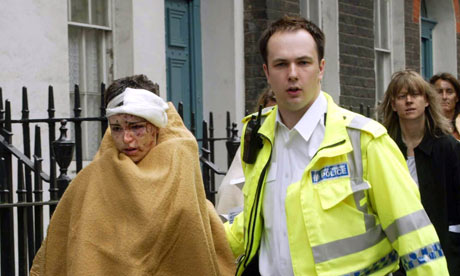Report will recommend far-reaching changes to rebalance international law in favour of those who have suffered
Police help a wounded women to safety after 7 July 2005 terrorist bomb attacks in London. Photograph: Paul Woodmansey/Rex Features
People seriously injured or maimed by terrorist attacks across the world would be granted automatic legal rights to compensation and rehabilitation under far-reaching changes to rebalance international law in favour of victims, a UN report will recommend next month.
The report, drawn up by the UN's special rapporteur on counter-terrorism and human rights, Ben Emmerson, a leading British lawyer, will be welcomed by the UK government at a time when the international legal system faces criticism for doing too much to protect the rights of alleged supporters of terrorism, such as the radical cleric Abu Qatada.
Emmerson's report, details of which have been obtained by the Observer, is to be presented to the UN human rights council in Geneva on 20 June and the general assembly in New York on 28 June. It is understood to have support in the Foreign Office and other UK departments, including the Home Office. The report is also thought to have backing among Council of Europe members, including Spain, which has led the international campaign to highlight the rights of victims of terrorism.
Emmerson will press the case for life insurance policies, most of which do not at present cover people killed in terrorist attacks, to pay up to bereaved next of kin. The proposals would also affect travel insurance policies that cover medical and other care for those killed or injured through terrorism while on holiday.
Groups set up to support victims and the bereaved have welcomed the progress that is being made.
The report comes after a four-year campaign by the family of Mumbai bomb victim Will Pike, 31, who was left disabled. Along with other British victims of the Mumbai attacks – and of those in Bali, Turkey and Egypt – Pike was left without financial help to cope with his injuries.
Few states outside western Europe have satisfactory compensation systems, including the US, although Washington did set up a special scheme to compensate 9/11 victims.
The report will say that full and effective reparation should include, as appropriate, restitution, compensation and rehabilitation.
It also says states should consider whether to legislate to prohibit the sale or marketing of life assurance policies that contain an exclusion for deaths that result from acts of terrorism.
In the UK, victims of terrorism can apply for compensation through the Criminal Injuries Compensation Authority. Payments range from £1,000 to £500,000. However, while the UK has a system in place, survivors of the 7/7 attacks have complained of long delays.
In April this year, the justice secretary, Kenneth Clarke, set out details under which the UK government would make ex gratia payments to victims of terrorist incidents which take place outside the UK. These range from payments for minor wounds such as tendon injuries (£2,500) to quadriplegia, which would qualify for a payment of £250,000.
The Emmerson report, if accepted, would have the effect of obliging all UN states to adopt a uniform set of standards, establishing more firmly in international law the principle that terrorist acts amount to violations of the human rights of the victims, irrespective of the question of direct or indirect state responsibility.
unjustified intrusion by the media following attacks. Following the 9/11 attacks on New York and Washington many families complained of media intrusion, particularly in the immediate aftermath. Victims of terrorism would include those who have been killed or who have suffered serious physical or psychological injury; next-of-kin or dependants of a direct victim and innocent individuals who have been killed or suffered serious injury indirectly attributable to an act of terrorism.
A foreign office spokesperson said: "We agree that the rights of victims of terrorism are fundamentally important. The UK has a good track record domestically for protecting the rights of victims. The way that work to further this might be taken forward internationally needs careful consideration if it is to be effective and implemented by all states. It will be important that proposals are evidence-based and that there are opportunities for thorough consultation with states and civil society."
SOURCE: http://www.guardian.co.uk/world/2012/may/12/un-compensate-terrorism-victims

No comments:
Post a Comment